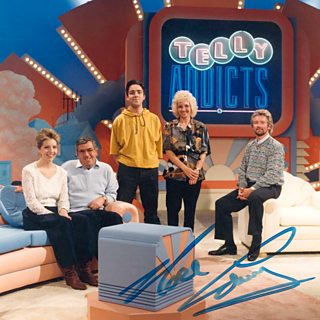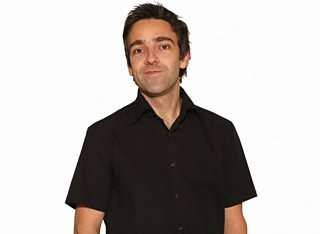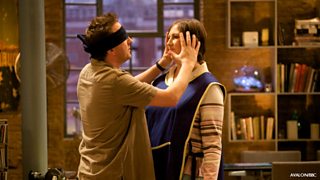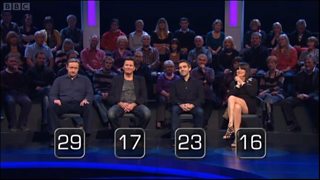Stars of Genome: Andrew Collins
Tagged with:

Andrew Collins (resplendent in mustard) made an early TV appearance on Telly Addicts
Andrew Collins is a broadcaster and writer with numerous credits to his name.
He has written scripts for EastEnders, co-wrote the first two series of sitcom Not Going Out, and along with Stuart Maconie co-hosted a show on Radio 1. Andrew still maintains a connection with the current Radio Times as its regular film editor. He also hosts a on UKTV's YouTube channel.
Here he takes a trip through his career by way of his listings in Genome - an estimated 450 (including credits in the magazine).
_____________________________________________________________________________
What was your first job in radio or television? My first appearance on television was in 1980. My schoolfriend Paul Garner and I were invited to guest on �������� news programme Look East to talk about the caricatures we’d started drawing for local Northampton newspaper the Chronicle & Echo.
It was an exciting day. The school gave us time off, my dad drove us to Norwich, we pre-recorded an interview with presenter Ian Masters, then repaired to the green room, where soft drinks were free, and drew a caricature of Masters and fellow presenter Tony Scase, which we presented to them live at the end of the broadcast.
Only one of our friends, Craig, had parents with a video recorder, so we were able to watch our appearance back and soak up the fame the next day. I was paid an £8 appearance fee, which to me was a fortune! Dad got £38 travel expenses, which he kindly split between me and Paul.
My second appearance was 10 years later with my family when we were by which time I worked on the NME. We made it through to the semi-finals and were knocked out by the Allman family. As a self-consciously “cool” music journalist, I ought to have been embarrassed by this, but I wasn’t. Not at all. I even wore an NME t-shirt on our final appearance.
My first job on television was as a scriptwriter on Family Affairs, brand new Channel 5’s soap in 1997. My day job was editor of Q magazine, but I was getting itchy feet. I’d never written a script, but with five episodes a week, they needed to run in new writers, and I was lucky enough to be one of them. I ended up writing around 33 episodes over the next three years. And yes, I did leave my day job.

Andrew Collins says he is 'impressed' by the digitisation of Genome's listings
Do you remember the first time your name appeared in the Radio Times? My first solo mention must have been when I formed a comedy double act with my NME colleague and great friend Stuart Maconie. We had our own comedy series called on the youth-aimed Radio Five – this was before it became news-and-sport Five Live. Although technically my name appeared before that, in 1988, when, as an avid Radio Times reader, I had a letter printed in the magazine and was chuffed to bits.
How did you feel when your photo was first published in the magazine? It was quite disarming. When Fantastic Voyage started, the magazine ran a small interview with an amusing press photo in which I am sucking on a plastic cigar. The Radio Five publicist, ever resourceful, brought it along to the photographic studio, and I was playful enough to use it.
Can you tell us your memories of the following programmes which you are associated with in the listings?
After Fantastic Voyage, suddenly our names were in the title of a brand new Radio 1 review show. We used smart, funny journalistic types as our regular guests like Caitlin Moran, Miranda Sawyer and David Quantick. It was such fun to do – we also interviewed famous pop stars and had bands playing unplugged. This led to Stuart and I being asked to host Radio 1’s live coverage of the Brits and the newly-minted Mercury Prize for at least two years running. It seems almost surreal that we were part of of the nation’s favourite radio station at such a relatively early stage of our tenure, but this was the 90s of Cool Britannia – anything could happen!

Andrew says he is most proud of Not Going Out episode Winner
My apprenticeship at Family Affairs directly led me to EastEnders. Its launch producer Mal Young moved to the �������� and put my name forward. I tried out via the regimented induction process for new writers. They give you a storyline document and you have to write a number of scenes based upon it. You then hand this in, like an exam paper, and they decide whether they want to develop the relationship further.
I’ve just looked at the script I submitted – in it, Roy goes into the shop and asks Terry, “I’m in a bit of a hurry. Do you sell drawing pins?” Terry replies, “Over there with the Sellotape.” With dialogue like that, it was a forgone conclusion! Seriously, to my great delight, I was accepted.
I managed to earn consistent script commissions from 1999 to 2001, and had my name on 11 episodes, something I remain inordinately proud of. I even got to kill off a regular character: Nick Cotton’s son Ashley. It was hard work: you are expected to write up to six drafts of each script. I used to compare writing an episode to producing a single slice of salami that would fit perfectly into a whole sausage.
And yes, I did get to walk round Albert Square, but only once – you’re too busy writing to hang around the set! However, Barbara Windsor did give me a kiss after an official �������� drinks party.
Being put together with Lee Mack was the most significant blind date of my career. He’d been developing a sitcom based on a live show, and I was drafted in to help with the structure. I clicked with Lee and we were quickly set to work in a rented office in Central London.
I thought of the title, so was really hoping nobody would come up with a better one! Luckily nobody did. It was hard graft for six months’ solid, but Lee and I found a good, symbiotic working relationship, which included each of us coming up with five suggestions for each punchline and choosing the best one.
Because it was shot in a studio, I was present for the entire recording, which I soaked up. I co-wrote the whole first series with Lee, then the majority of series two with him, and a couple of episodes in series three and four, after which they decided to streamline the writing process. And Not Going Out is re-run on a constant loop, so it’s lovely to have had a hand in something that’s endlessly repeated.

Second had to be good enough on an edition of Celebrity Mastermind
You are also noted in the listings for your work as a screenwriter. What is it like to breathe life into new characters and add to existing ones? I could barely believe it when I first got to write dialogue for iconic EastEnders characters like Dot, Nick, Phil and Peggy. But these characters already had voices, your job was to stay true to them. A completely different job to creating a character, which I was able to do in my first solo-written sitcom Mr Blue Sky for Radio 4. It’s a treat to have actors as skilled as Mark Benton, Rebecca Front and Claire Skinner, as they will do things to your words that you might never have envisaged. But the very act of typing words to be read out by professionals is hard to beat.
How important do you think it is to preserve the history of TV and radio listings? I live for printed TV and radio listings. Because I now work for Radio Times, I get sent a contributor’s copy, but if I’d never set foot in the building of the magazine I’d still be a subscriber. Online listings are fine if you want to do a quick search, but on a week by week basis there’s nothing to beat literally flicking through a magazine, browsing, happening upon the odd gem. I am a child of the analogue age, but as an adult, I am totally wired – and certainly not a Luddite. At the Radio Times office there is an archive of every copy of the magazine, which I am lucky enough to be able to use. Paper archives are unutterably romantic to me. I am hugely impressed by the digitisation that the �������� Genome project has achieved, because it’s available to all, as it should be in an information democracy.
Have you ever searched for your own name in the Genome database? I have, of course. I’m pointlessly troubled by the fact that there is another Andrew Collins in the world who seems to have quite a following – he’s an author and speaker who specialises in ancient Egypt, Atlantis, UFOs, that kind of thing – but it’s not a competition. There’s a well-regarded writer of gay travel guides with the same name, too, and an actor in LA. But I think I may be the only one to be listed in the Radio Times archive, so that’s something.